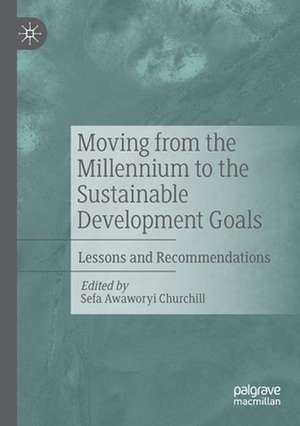Moving from the Millennium to the Sustainable Development Goals: Lessons and Recommendations
Editat de Sefa Awaworyi Churchillen Limba Engleză Paperback – 26 apr 2021
| Toate formatele și edițiile | Preț | Express |
|---|---|---|
| Paperback (1) | 642.03 lei 6-8 săpt. | |
| Springer Nature Singapore – 26 apr 2021 | 642.03 lei 6-8 săpt. | |
| Hardback (1) | 646.62 lei 3-5 săpt. | |
| Springer Nature Singapore – 26 apr 2020 | 646.62 lei 3-5 săpt. |
Preț: 642.03 lei
Preț vechi: 755.33 lei
-15% Nou
Puncte Express: 963
Preț estimativ în valută:
122.87€ • 126.93$ • 102.26£
122.87€ • 126.93$ • 102.26£
Carte tipărită la comandă
Livrare economică 26 martie-09 aprilie
Preluare comenzi: 021 569.72.76
Specificații
ISBN-13: 9789811515583
ISBN-10: 9811515581
Pagini: 366
Ilustrații: XIX, 366 p. 9 illus.
Dimensiuni: 148 x 210 mm
Greutate: 0.46 kg
Ediția:1st ed. 2020
Editura: Springer Nature Singapore
Colecția Palgrave Macmillan
Locul publicării:Singapore, Singapore
ISBN-10: 9811515581
Pagini: 366
Ilustrații: XIX, 366 p. 9 illus.
Dimensiuni: 148 x 210 mm
Greutate: 0.46 kg
Ediția:1st ed. 2020
Editura: Springer Nature Singapore
Colecția Palgrave Macmillan
Locul publicării:Singapore, Singapore
Cuprins
Part I. Overview of Development Goals.- Chapter 1: The Millennium Development Goals (MDGs): What are they? How were they devised? Were they appropriate for developing countries?.- Part II. What Influenced MDGs?.- Chapter 2: Ethnic diversity and MDGs.- Chapter 3: Social capital and MDGs.- Chapter 4: Culture, religion and development.- Chapter 5: Democracy, good governance and development.- Chapter 6: Conflict, Fragility and the achievement of MDGs.- Chapter 7: Institutional Innovation and Development.- Chapter 8: Did foreign aid hinder progress towards the achievement of MDGs?.- Chapter 9: Trade openness, foreign direct investment and the MDGs.- Chapter 10: Financial Inclusion and Poverty.- Chapter 11: FinTech and Development.- Chapter 12: Microfinance, Poverty and Microenterprise Development.- Part III. The Post-2015 Agenda.- Chapter 13: The Sustainable Development Goals (SDGs): what are they? How different are they fromthe MDGs?.- Chapter 14: Achieving the SGDs: Lessons from the MDGs.- Chapter 15: The Way Forward.
Notă biografică
Sefa Awaworyi Churchill is a Senior Research Fellow with the School of Economics, Finance & Marketing at RMIT University, Australia. He holds a PhD in Economics from Monash University. His inter-disciplinary research focuses on development economics, addictive behavior, ethnic diversity, wellbeing, and other issues related to sociology, health and economics. He has experiences working on consultancy projects for various policy agencies and international development organizations.
Textul de pe ultima copertă
With the introduction of the Sustainable Development Goals (SDGs), perhaps the most important questions on the minds of most policymakers is whether the Millennium Development Goals (MDGs) were successful and what factors may have influenced their achievement. Answering these questions is important for assessing the ongoing progress of the SDGs and identifying key policy areas to focus on. This important edited collection examines various dimensions of the MDGs and development goals more generally, from socioeconomic factors to institutional, financial and more.
The authors provide lessons and recommendations for attaining the Sutainable Development Goals that will be relevant to academics, development policymakers and practitioners, as well as NGOs, development agencies and students.
Caracteristici
Evaluates the factors that contributed to the success or failure of the Millennium Development Goals (MDGs) Uses an interdisciplinary approach but with emphasis on empirics and cross country analytical settings Investigates the implications of ethnic and religious diversity for development Analyses poverty alleviation tools such as micro finance and micro enterprise development
